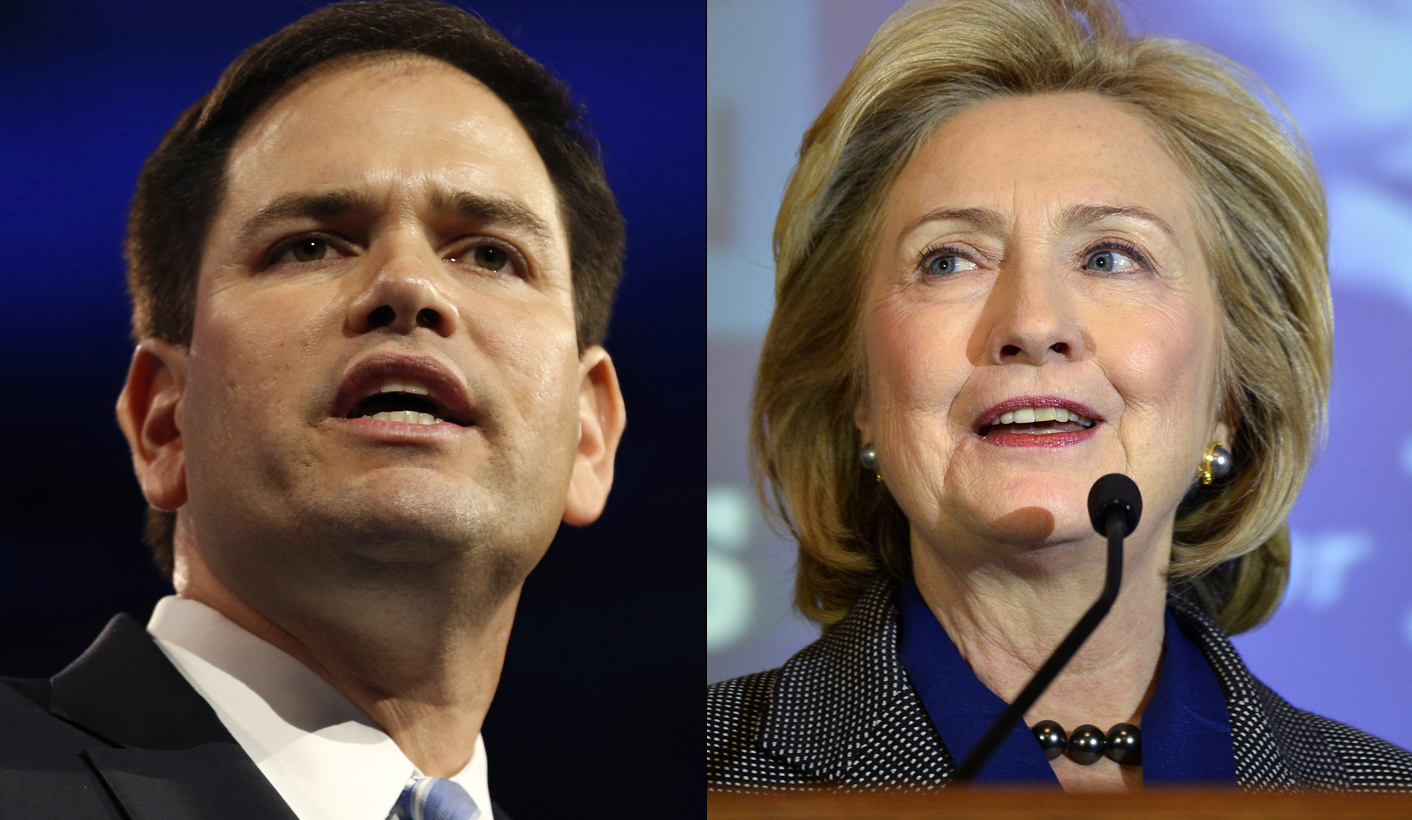The author can almost hear readers saying, “Oh no! Not the next American presidential campaign already! Didn’t we just have one?” But the thing of it is, many of the politicians who dream of becoming the candidate of their party for the American presidency - in less than three years’ time no less - are already deep into the hunt, living in a world that Bill Clinton defined as the permanent campaign. At this point, it has already become true even if they don’t want to leave any irrevocable footprints - just yet - about their final intentions.
Nevertheless, like anything else that has become the rough equivalent of an amphibious military invasion of hostile territory staffed by regiments of lawyers, it is the planning and preparation – and oodles of money – that are the crucial variables. And, in fact, former Secretary of State Hillary Rodham Clinton or Florida Republican Senator Marco Rubio already seem to be well into their respective preparations – just in case they take that final plunge into the pool. But, so far at least, they have taken rather different first steps.
The other day, the Politico website provided the first detailed assessment of the planning already underway for a 2016 presidential campaign by former Secretary of State (and New York Senator and First Lady) Hillary Clinton. Right from the start, such planning must consider a complex timeline of different filing deadlines in the fifty states for the party’s primaries and caucuses. Then there is the vexed question of the gobs of money that will have to be raised. And then there is the even more complex question of sophisticated field operations (including a thorough use of social media, surveys, voter by voter contact and canvassing, and all the polling that will feed the machinery). And all of that will need to be designed, staffed – and, ultimately, paid for.
According to Politico, “Clinton insists she’s many months away from a decision about her political future. But a shadow campaign on her behalf has nevertheless been steadily building for the better part of a year — a quiet, intensifying, and improvisational effort to lay the groundwork for another White House bid. Some of the activity has the former first lady’s tacit approval. Some involves outside groups that are operating independently, and at times in competition with one another, to prepare a final career act for the former senator and secretary of state, whose legacy as the most powerful woman in the history of American politics is already secure.” Politico adds that this constitutes what they describe as a “virtual campaign in waiting”, even though it has sometimes been divided into different camps. One of these is her coterie of long-time friends, staffers and personal loyalists. A second includes two presumably independent policy advocacy groups that are closely tied to a candidate’s views and goals (the so-called super-PACs). And there are other groups working beyond any approval – so far - by the putative candidate.
Such a divided support base – all presumably working for the same goal, but with very different styles - could become a real downside for Clinton down the road if it isn’t thoroughly brought into sharp focus. As veteran campaign strategist Tad Devine told Politico, “There’s upside and there’s risk” to this patchwork of outside forces. “The upside is that people are out there doing valuable and important work for you. In a campaign, when people are acting on your behalf but they’re not driven by an agreed-upon strategy, then that’s the risk.” In fact, factionalism has frequently been a feature of Clinton campaigns in the past and it could be a real problem for any future, final campaign as well.
Nevertheless, Politico quotes West Coast-based political strategist Chris Lehane that in thinking about all the prep work that is already taking place and the involvement of people like Jefrey Katzenberg (of DreamWorks fame) and Jim Messina (Barack Obama's 2012 campaign manager), it “reflects the fact that the Obama political infrastructure is seamlessly transitioning to serve as [Clinton’s] political infrastructure. And [it] sends a signal to both Obama donors and operatives that it is all right to begin actively supporting the Clinton ’16 effort.”
There are, of course, aides and friends who hope she will not run, in part because such a meat grinder would end her professional career on a low note – if she were to lose either the nomination or the election. And a health issue or some other event could make her candidacy more complicated. Politico notes, “Democrats could struggle mightily in the midterms, and Obama could have another difficult year. Another foreign policy headache could emerge, posing a fresh challenge for the former secretary.”
Any of these issues could derail a possible Clinton campaign, but the machinery – the initial campaign planning, the fund raising mechanisms and key persons, and support base building - is already in motion. The biggest unknown would seem to be how her husband and daughter feel about Hillary Clinton taking on one final race. Politico notes that without publicly saying she should or must run, “Bill Clinton has also continued to amass political chits that could be useful for Hillary down the road. He has endorsed a string of candidates running against people who did not back his wife in 2008. And he has weighed in on issues in ways that could be helpful to his wife, given the assumption people make that one is speaking for the other.”
Meanwhile, over among conservative Republicans, Florida Republican Senator Marco Rubio, in contrast to the Clinton approach of building the mechanics and machinery has taken the approach of staking out highly visible policy positions first. In contrast to a politician like Hillary Clinton who is universally well-known after two generations in national public life, Rubio’s most important initial task in the long run-up to a presidential campaign would seem to get himself publicly identified with policy ideas and then attract the kinds of funding and organisational support necessary for a convincing run for the gold medal.
Watch: Marco Rubio on War on Poverty
In line with such an approach, Rubio has just released a crisply scripted video on YouTube in which he sets out his own approaches on reducing poverty and improving income mobility, timed to coincide with the fiftieth anniversary of President Lyndon Johnson’s declaration of a “war on poverty” but starkly different from the usual Democratic Party proposals and ideas. This apparently will be only the first of many more efforts to talk about how he would improve income mobility in America. Income inequality seems poised to become one of the key issues for a 2016 campaign, perhaps even more so than the fight over the impact of Obamacare.
As Rubio says in his video, “[I]sn't it time to declare big government's war on poverty a failure? Instead of continuing to borrow and spend trillions of dollars on government programs that don't work, what our nation needs is a real agenda that helps people acquire the skills they need to lift themselves out of poverty and to pursue the American dream. This agenda would create an economy with more good-paying middle class jobs and a government with less debt. It would repeal ObamaCare and it would replace it with more affordable health care options. It would save and strengthen our retirement programs for future generations…. In the coming months, I'll be detailing many of these ideas, and I hope that you'll join me in that discussion - so that 50 years from now, nobody in America will be trapped in a life of poverty.”
As a political party, the Republicans, of course, while contemplating the 2016 presidential election year in their spare time, have been more closely focused on seizing majority control of the Senate in this year’s midterm election. (The Democrats, of course, have to defend those seats, but that would not be Hillary Clinton’s primary task at this point – although she can gain party points by campaigning actively for candidates under siege.) Nevertheless, the Republicans also continue to have their own internal civil war over how to pick candidates for each and every congressional race – with far right candidates poised to fight off moderate or moderately rightward candidates. In this set of battles, a political network spearheaded by conservative billionaires Charles and David Koch has built up an vast operation built around a whole cloud of groups, largely operating beyond the campaign finance regulatory system, that, according to a recent report in the Washington Post, is already actively “engaging in the 2014 midterm elections, hiring new staff members to expand operations and strafing House and Senate Democrats with hard-hitting ads over their support for the Affordable Care Act.”
Once that 2014 election is over, expect these Koch-related groups to focus much more closely on the policies and positions of the unruly posse of potential Republican presidential candidates – Senators Rubio, Rand Paul, and Ted Cruz as well as Governors Chris Christie, Scott Walker and Bobby Jindal, among others – all of whom will vie for the opportunity to make use of the Koch-funded super PACs and the other related bodies as they try to build a campaign apparatus. Meanwhile, for the Democrats, all the required mechanisms just seem to be waiting for Hillary Clinton to say the word.
This whole thing is only just beginning. DM
For more, read:
Hillary Clinton's shadow campaign at Politico;
“War on Poverty”, the Senator Marco Rubio video released on YouTube on 5 January 2014;
Koch-backed political coalition, designed to shield donors, raised $400 million in 2012 at the Washington Post.
Photo: Hillary Clinton and Marco Rubio (Reuters)





